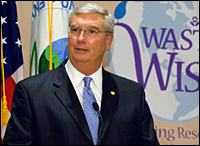
The Bush administration made clear today that it doesn’t intend to do anything about climate change in the final six months in office, announcing that instead of responding to the Supreme Court’s mandate last year that the EPA determine the dangers posed to humankind by greenhouse-gas emissions they would simply request further public comment.
The White House and EPA released their much-anticipated Advanced Notice of Proposed Rulemaking today, after weeks of disputes between the EPA and the Office of Management and Budget about what that notice should look like.

The ANPR was supposed to be a response to the April 2, 2007, Supreme Court decision in Massachusetts v. EPA, which found that greenhouse-gas emissions could be regulated under the Clean Air Act if EPA determines they pose a threat to public health and welfare. But rather than coming forward with a response, EPA administrator Stephen Johnson today announced that they are seeking four months of further public comment on the matter — pretty much running out the clock on the Bush presidency without any meaningful action.
Johnson defended the agency’s decision in a phone call with reporters this afternoon, saying that the decision was due to the “complexity and importance” of the issue, and it would be “premature” to set regulations at this point. “I thought it would be irresponsible of me to push forward,” said Johnson.
Johnson also tried to spin the decision to eschew rule-making in favor of more public comment as “historic in its transparency.” The move to put the entire document — totaling more than 1,000 pages with appendices and intra-agency memos — up for public comment isn’t something that has happened before, at least in recent memory, according to both Johnson and Hill staffers who have been following the EPA’s actions.
He also maintained that the Clean Air Act is “ill-suited for the task of regulating greenhouse gases,” and doing so amounts to fitting a “square peg in a round hole.” Instead, “it should be Congress’s responsibility” to pass new regulations specifically regarding greenhouse-gas emissions.
“If we’re serious about addressing climate change, the Clean Air Act is not the way to do it,” said Johnson.
While many at the EPA agree that the Clean Air Act isn’t the ideal regulatory tool for regulating greenhouse-gas emissions, it’s the best tool currently available, and the one that the Supreme Court directed the agency to use. As former EPA deputy administrator Jason Burnett, who resigned over this rulemaking dispute, told Grist recently, the agency’s experts found that the public is endangered by greenhouse gases, and the Clean Air Act “must be used unless Congress passes a new, better law.”
According to previously leaked drafts from EPA officials, experts in the agency actually concluded that the benefits of new, tougher standards “far outweigh their costs.” In fact, if gas prices stay in the range of $3.50 a gallon, “the net benefit to society could be in excess of $2 trillion” through 2040 if fuel efficiency standards for automobiles are raised “well above 35 mpg.” And that was apparently an amended version of the findings of EPA officials — earlier drafts that the White House decided to ignore were supposedly even more assertive.
Burnett said earlier this week that after he sent the EPA’s strong original conclusions to the White House Office of Management and Budget in December of last year, he received a “phone call from the White House” asking him to to send a follow-up email saying that the document “had been sent in error.” When he refused, the White House decided to ignore the email.
Since then, EPA and OMB have been wrangling over what should be included in the public ANPR. The Washington Post has a fascinating article today about the interagency discussions at the EPA. They also note that the administration refused to publish a document from EPA staff emphasizing the benefits of curbing greenhouse-gas emissions along with the ANPR they dropped today.
Rep. Edward Markey (D-Mass.), chairman of the House Select Committee for Energy Independence and Climate Change, accessed all the earlier draft documents from the EPA, and said in a statement today that the ANPR released today significantly watered down the findings from the agency’s experts.
“Today’s sanitized and censored global warming proposal is a shadow of what the scientific experts say is needed to save the planet,” said Markey in a statement today. “The White House has taken an earnest attempt by their own climate experts to respond to the Supreme Court’s mandate to address global warming pollution, and turned it into a Frankenstein’s monster.”

